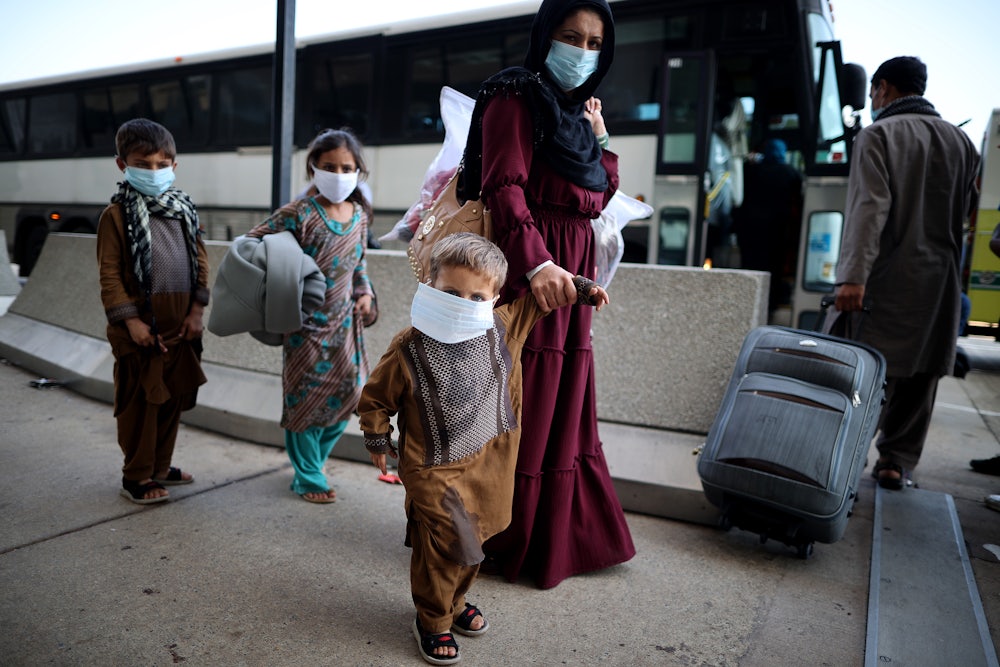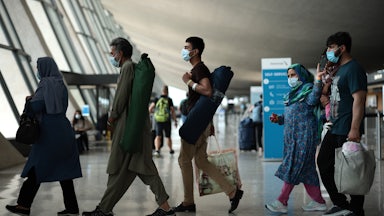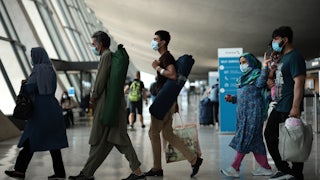Nearly six months after a chaotic and widely criticized withdrawal of U.S. troops from Afghanistan, capping an ignominious two decades of conflict that saw the war-ravaged country quickly retaken by the Taliban, the Biden administration and Congress have yet to fully address the lingering crises facing the American allies left behind and the evacuees living in limbo without a pathway to citizenship.
The destabilized situation presents a crisis with multiple fronts, both in Afghanistan and here at home. Lawmakers must solve the problem of how to offer humanitarian aid to the country’s suffering civilians and how to continue to evacuate Afghan allies who aided Americans now that they and their families are in grave danger. Once evacuated, however, there is the matter of resettling the evacuees and providing them with a pathway to permanent residency before their temporary parole status expires after two years.
The situation in Afghanistan is stark. Around 23 million people, more than half of Afghanistan’s population, do not have enough to eat, and 8.7 million are at risk of starvation, according to the United Nations. The United States announced earlier in January that it was providing an additional $308 million in humanitarian aid to the Afghan people, bringing the total up to more than $700 million in assistance since October. But some lawmakers argue that the administration needs to release some of the Afghan financial assets frozen by the U.S., including $7 billion at the Federal Reserve Bank of New York. A bipartisan group of representatives sent a letter to the White House last month asking that some of those assets be distributed through U.N. agencies to address the humanitarian crisis. (On Friday morning, The New York Times reported that Biden is taking steps to direct $3.5 billion of that money toward humanitarian relief in Afghanistan.)*
While some members of Congress have pressed the administration to do more to aid Afghan citizens, they also acknowledge the challenge of assisting innocent civilians without unwittingly aiding the Taliban. “This is a really difficult, vexing problem. We can’t and shouldn’t do anything that empowers the Taliban,” Senator Chris Murphy told The New Republic. “But we were part of a 20-year effort to break this country in half, and we do have an obligation to help make sure that the Afghan people who we were helping to protect for 20 years don’t starve.”
Beyond the need for humanitarian assistance, there are still Afghan allies trapped in the country, seeking to evacuate but unable to receive a special immigrant visa, which has a prohibitively complex application process and a massive backlog. In July, the House passed a bill to increase the SIV allotment and expedite the application process, although the measure never passed in the Senate.
Although the administration evacuated and brought 75,000 Afghans to the U.S., The Wall Street Journal reported in December that more than 60,000 Afghans who had applied for visas to seek a safe haven in the U.S. remain in Afghanistan. Roughly half had cleared their initial vetting requirements, but 29,000 are still mired in the earlier stages of the application process.
“I think we need to continue to be very aggressive about evacuations,” said Representative Jason Crow, who sponsored the bill that passed in July. “You can pass all the laws you want, and make all the changes to the regulations you want, and resettle folks. None of that matters if our partners are killed by the Taliban, and they’re dead and they can’t leave Afghanistan.”
To expedite evacuations of at-risk Afghans over the course of last summer, the Biden administration relied heavily on the use of humanitarian parole to bypass the lengthy refugee process. According to a report by the Department of Homeland Security shared with Congress late last month, more than 70,000 Afghans had been granted parole to enter the U.S. as of November 15.
But unlike refugees or people who obtain SIVs, parolees do not have a direct pathway to permanent residency. Traditional refugees admitted under the asylum program become eligible for permanent residency one year after entering the U.S., and people admitted as special immigrants receive green cards upon entering the U.S. The DHS report found that more than 36,000 of the Afghan evacuees who have resettled in the U.S. do not have a pathway to secure permanent legal residency. But like the SIV program, the asylum program has a lengthy application process and a significant backlog. (According to the report, more than 36,000 could qualify for permanent residency through the SIV program, a number including both applicants and those expected to apply.)
“I can’t describe how difficult it is to start over from scratch in a new country. We’ve got people coming off military bases with one pair of sandals about to brave their first winter,” said Krish O’Mara Vignarajah, the president and CEO of the Lutheran Immigration and Refugee Service, or LIRS, one of the organizations helping to resettle Afghan evacuees. “We’re talking about people who are expected to build a new life in a new country, and oftentimes in a new language.”
LIRS and other organizations involved with settling Afghan refugees have called on Congress to pass the Afghan Adjustment Act, which would provide a pathway for parolees to apply for permanent status after one year. Congress has previously passed adjustment acts for Cubans, people from Southeast Asia, and Iraqis.
“Months have passed since the majority of our Afghan allies have arrived in the U.S., and no more permanent status has been given to them,” O’Mara Vignarajah said. “Every day that … is delayed is time that the healing process can’t begin, that they continue to face this anxiety-inducing uncertainty.”
“I think our two principal concerns are: seeing the Biden administration prioritizes the Afghan Adjustment Act and that they act consistent with their repeated claims that though the military presence has ended, the mission has not,” O’Mara Vignarajah said.
Alleviating these concerns would require action from both Congress and the White House; for example, having the legislature authorize more special immigration visas and having the State Department process them more quickly; or having the administration expedite the refugee process for Afghans still needing to be evacuated and Congress passing an adjustment act for parolees already here.
Last fall, Congress made evacuees eligible for refugee resettlement benefits such as Medicaid, food assistance, and placement support, and directed U.S. asylum officials to accelerate the application process for these parolees. The Department of Homeland Security in November announced that it would exempt asylum application fees and streamline the process for Afghan parolees. Axios also reported in January that the Biden administration was looking to expedite the refugee process, immediately putting Afghan evacuees in Qatar on track to obtaining permanent residency.
Meanwhile, some members of Congress say they would still like to take action to aid parolees now in the U.S. “I’d like to see us come together in a bipartisan way to craft and pass an Afghan Adjustment Act identical to what we did at the end of the Vietnam War and the Cuban Revolution to provide a specific pathway for thorough vetting, in-person interviews, and a direct path to green card status for those who we evacuated. I’ve had some positive conversations about that,” Senator Chris Coons told The New Republic.
Senator Tim Kaine, who represents Virginia, where thousands of the Afghan evacuees have been settled, told The New Republic in a statement that the parolees had been thoroughly vetted and needed Congress to provide a pathway for them to obtain permanent residency. “Now that they are living here, we should make sure that they can quickly integrate and become productive members of our communities. One of the best ways to do that is to ensure that they have permanent legal immigration status, so that they can live and work in the U.S.,” Kaine said.
The Biden administration has encouraged lawmakers to take such action. “We have asked Congress to pass legislation to give our Afghan partners who entered through humanitarian parole a clear pathway to permanent status, and we continue to support those efforts,” a spokesperson for the National Security Council told The New Republic. The spokesperson added that the administration is “encouraging Afghan evacuees to apply for special immigrant status or for asylum if they are eligible.”
But some Republicans have raised questions about the vetting process and claimed that some evacuees were not properly vetted before entering the U.S. The DHS report said that “several hundred” evacuees had been barred from entering the U.S. and that, as of mid-January, around 200 evacuees and associated family members were still undergoing “additional screening and vetting outside of the United States.” The report also said that the “multi-layered” vetting process was conducted by intelligence, law enforcement, and counterterrorism officials. “We do have some resistance from my Republican colleagues who, a couple years ago, were saying that they’re here to help out the Afghan refugees, but now won’t actually back it up,” Representative Ruben Gallego told The New Republic.
Adam Bates, policy counsel at the International Refugee Assistance Project, noted that any Afghan seeking asylum would need to file an application within one year of arriving in the U.S.** If thousands of Afghan evacuees have no choice but to apply for asylum, which has a backlog of more than 400,000 applications, that would be a “tremendous waste of time and energy and taxpayer money and government resources, and it would not benefit any of the people already in the asylum system.”
“For all intents and purposes, they are refugees. The only reason they’re not being treated as refugees in our system is because the administration paroled them in instead of admitting them as refugees,” Bates said. “But philosophically, in terms of their experience, and their status, and who they are, and why they’re here, there’s every reason that our law should treat them as if they had entered as refugees and allow them to apply for green cards.”
Bates criticized the administration for demonstrating “a lack of urgency in terms of needing to protect Afghan refugees when the country collapsed,” and for not doing more to expedite the SIV and asylum application processes earlier, citing a separate Axios report of leaked documents showing the Biden administration was unprepared to begin evacuations shortly before Kabul fell to the Taliban. He also noted that while SIV recipients could bring their spouses and children under 21, that excluded many extended family members. (The administration had expedited SIV processes since Biden took office last January, issuing more than 8,400 SIVs in 2021.)
“My sense is, the administration would like to turn the page on Afghanistan and be done with it, and they’re not done. The U.S. government is not done. The promise is not fulfilled,” Bates said.
* This article has been updated.
** This article originally misidentified Adam Bates and the name of his organization.










